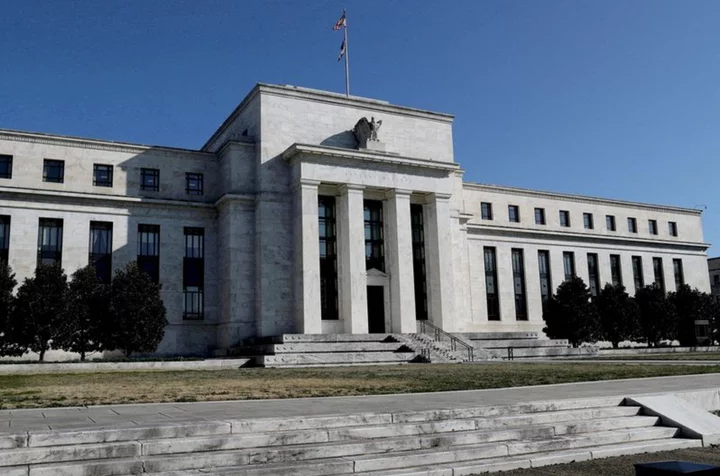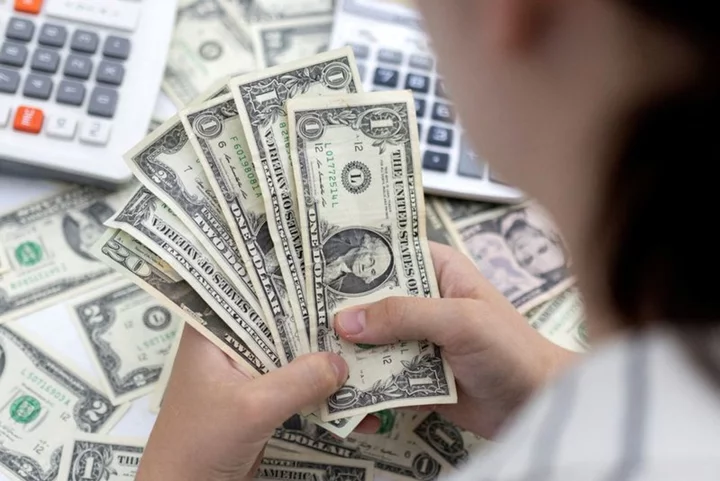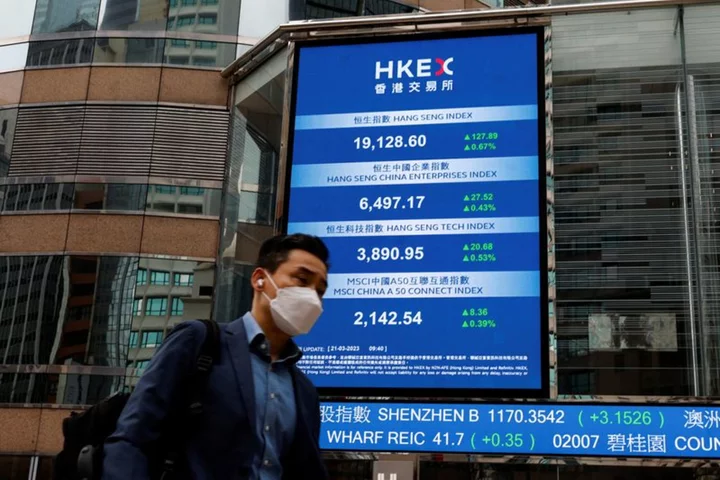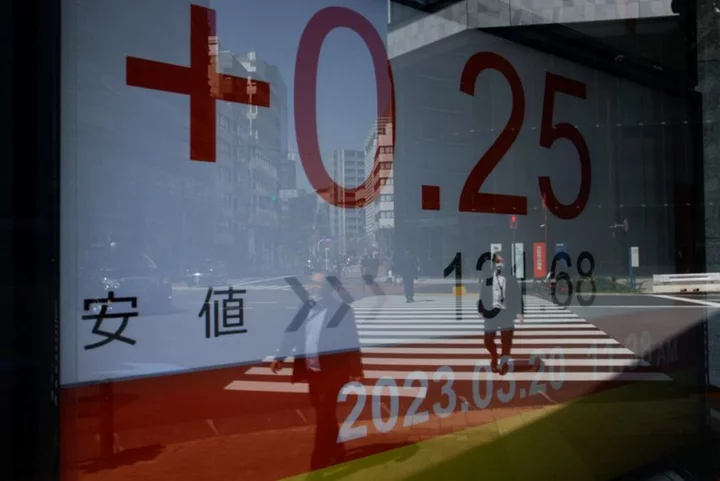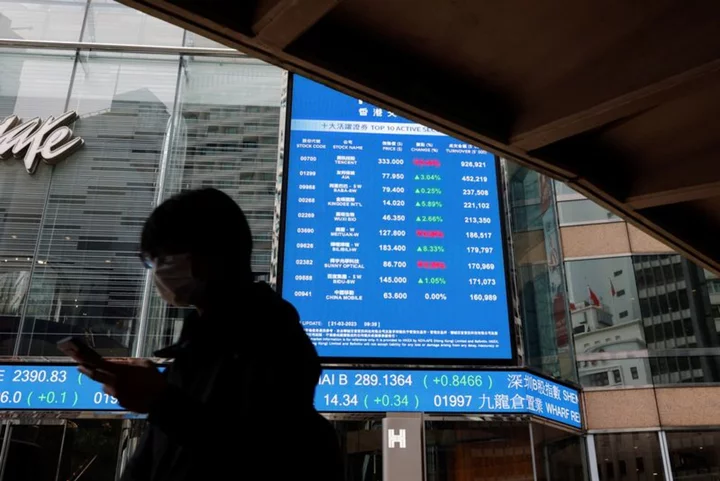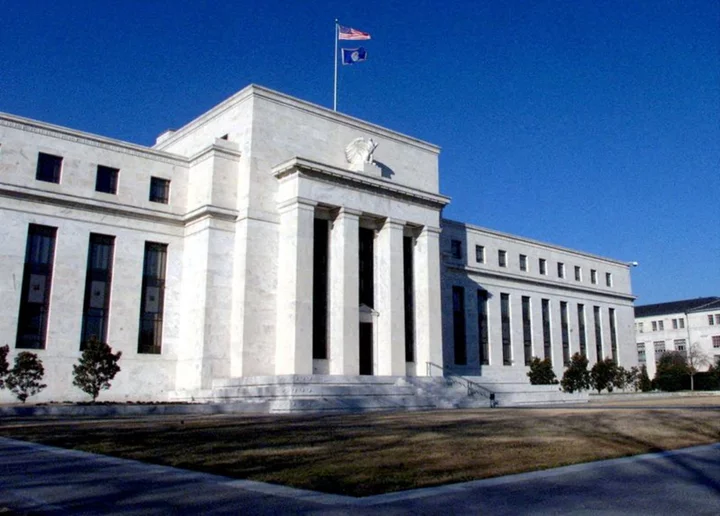It's a week of the central bank heavies with the U.S. Federal Reserve, European Central Bank and Bank of Japan meeting.
The Fed is tipped to stop with rate hikes (for now), the ECB, to keeping going (for now), while the BOJ remains in stop mode (for now). U.S. inflation numbers, Chinese data and a crunch moment for UBS and Credit Suisse means there's plenty happening.
Here's a look at the week ahead in markets from Li Gu in Shanghai, Kevin Buckland in Tokyo, Ira Iosebashvili in New York, Yoruk Bahceli in Amsterdam, and Noele Illien in Zurich.
1/ A LOT GOING ON
Markets get not one but two headline events with U.S. May inflation data out on Tuesday as the Fed kicks off its two-day meeting.
Signs that U.S. inflation continued to cool in May would likely be welcomed by markets, after strong jobs data bolstered the case for those betting rate hikes are easing price pressures without badly hurting growth. Headline consumer prices are expected to rise by 0.3% on a monthly basis, after a 0.4% increase in April.
The Fed is tipped to keep borrowing costs unchanged on Wednesday, and investors will be trying to gauge appetite for more hikes ahead. For now, markets price in just one more increase this year, an outlook investors seem comfortable with, judging by the recent strong performance of U.S. stocks.
2/ NOT DONE YET
On Thursday, another 25 basis-point ECB rate hike looks likely, and traders want clues from the euro zone's central bank on what comes next. The case for the fastest hiking cycle in its history to end soon is growing.
Euro area inflation fell faster than expected in May and core inflation - stripping out volatile prices - slowed for a second month. The bloc's economy has slipped into recession and bank lending is slowing fast.
Markets reckon the ECB will be done and dusted after one further 25 bps move, which economists polled by Reuters expect in July.
But rate setters will have to be careful to keep their options open. Core inflation, only just below a record, is still high, so some hawks are keeping a post-summer hike on the table.
3/ NO GO BOJ
Recently-appointed BOJ Governor Kazuo Ueda says Japan's collective mindset is gradually shifting away from its decades-long belief that consumer prices and wages will stay low.
However, emerging animal spirits were nowhere to be seen in April, when a big drop in household spending exceeded even the most bearish economists' forecast.
That makes sense considering other data showed real wages sliding for a 13th straight month, even as labor unions negotiated the biggest pay increase for three decades at spring wage talks.
It all cements the market's view that it's too soon for BOJ stimulus tweaks on Friday. Ueda has signaled ultra-easy policy will remain until wage gains and inflation are stable and sustainable. But the BOJ has a penchant for policy surprises, meaning complacency could prove painful.
4/ PEAK PESSIMISM?
Hopes that China could soon roll out further stimulus measures are running high, putting a floor under pessimism over a lackluster post-COVID economic recovery.
Property developer shares have rallied on speculation of a new property support package. A huge miss in China's May exports barely caused a dent in the market, as investors bet the weak data strengthens the case for stimulus.
May new home price data is due Thursday, after a private survey showed new home prices fell for the first time in four months in May and home sales slumped.
Other data released on Thursday could shed light on rising unemployment and cautious consumer sentiment, which have also hurt the economy. As each data point bolsters expectations for fresh stimulus, peak pessimism on China's economy has perhaps passed.
5/ SUPER-BANK
The rush to finalise a deal between Switzerland's largest banks may soon be over, with UBS expecting to complete the acquisition of rival Credit Suisse as early as June 12.
With it come questions of what the newly created super-bank, with a balance sheet of $1.6 trillion and overseeing assets of $5 trillion, will look like.
Many Swiss fear the combined bank will be too big and risky for the small, albeit wealthy, country. They are worried it will be hard to regulate and, if it ran into trouble, it could suck in the state. Swiss regulators already failed to avert disaster at Credit Suisse.
And what will happen to Credit Suisse's domestic business, seen as the collapsed bank's crown jewel, along with the thousands it employs? UBS already said culls to the combined bank's workforce of 120,000 are coming.
(Compiled by Dhara Ranasinghe; additioanl reporting by Rae Wee in Singapore and John O'Donnell in Frankfurt; editing by John Stonestreet)

